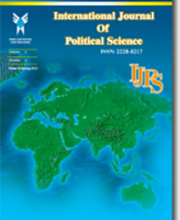
political science
International Journal of Political Science, Vol 12, No 1 , January & February 2022
مقالات
حوزه های تخصصی:
The Verbal Strategy of the United States in the Process of Securing Iran's Nuclear Program (2001-2021)
حوزه های تخصصی:
Data Analysis of the Implications of Linguistic Hegemony on the Culture and Identity of Language Learners; Case Study of the Iranian Language Center (2005-2017)
حوزه های تخصصی:
Pathology of the New Cyber Terrorism Threat to Iran's National Security
حوزه های تخصصی:
Iran's Regional Role and Russia-US Rivalry in West Asia
حوزه های تخصصی:
National Security Law as the New Basic Law of Hong Kong
حوزه های تخصصی:
Syrian Crisis: An Analysis of Political and Security Strategies of Involved Actors
حوزه های تخصصی:
Political Implications of "Self" and "Other" in the Political
حوزه های تخصصی:
Youth Attendance Foundation Data Analysis and Election Tools: A Case Study of the 11th & 12th Presidential Elections
حوزه های تخصصی:
Recognition of Allameh Naeini's Political Pragmatism in the Constitutional Movement
حوزه های تخصصی:
Examining the Public Literary Sphere with the Public Moral and Political Sphere in Contemporary Iran (With emphasis on Nima, Forough and Shamlou's poetry examples)
حوزه های تخصصی:
Designing a System Model of Good Governance in the Social Security Organization
حوزه های تخصصی:
War from the Perspective of Nietzsche and Kant
حوزه های تخصصی:
Kant believes that war should be considered a last resort with the utmost respect for human life and dignity. War should only be used when all other means of conflict resolution have been exhausted. Nietzsche considered morality as a human structure that has been used throughout history to suppress and control people, so peace is a sign of weakness and degeneration and a product of herd mentality. Real strength comes from conflict and struggle. Nietzsche considered peace as a necessary part of life, but only if it is based on power. Understanding and formulating the criticism of these two important thinkers on peace and what war is and how they interpret these concepts is the central issue of this article. Nietzsche believed that peace is not an end in itself, but a means to an end, and argued that peace is necessary for the development of higher forms of culture and civilization, but it should not be pursued at the expense of creativity and progress. On the other hand, Kant believed that countries should strive towards a more peaceful world order in which conflicts are resolved through dialogue instead of violence.